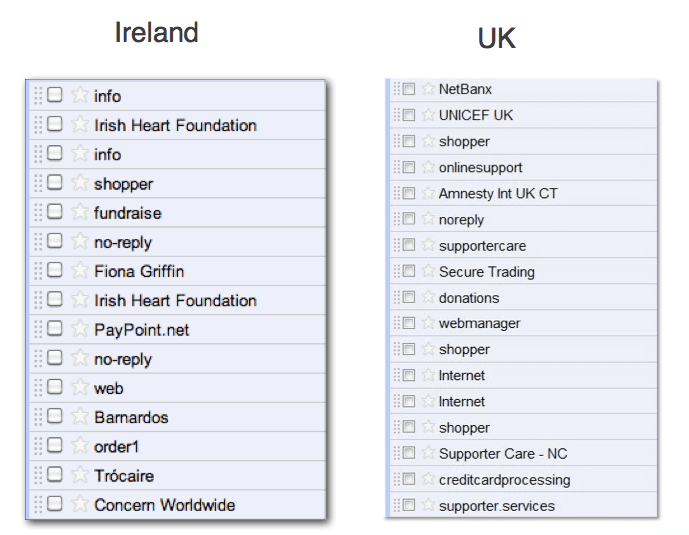Who sends your emails?
Along with Damian O'Broin of the rather good Irish fundraising agency, Ask Direct, I presented some findings taken from a massive international mystery shopping exercise (270 charities in six countries) at IOF London yesterday.
I'm going to post the full presentation online, but I thought it might be worth highlighting one or two specific findings in the meantime.
The first is the weird set of entities that send a thank you email in response to an online gift.
You'll see from the screen grab just some of the fun descriptions that people use. My own particular favourite is Internet. It's like being thanked for giving to a DM appeal by the Royal Mail.
To my mind it isn't really a great way to start a relationship and it looks like organisations like the Irish Heart Foundation, Barnardo's, UNICEF and Amnesty agree.

It might take a little effort and you might even have to change the people who process your payments, but I think it might be worth turning off the default receipt system and creating your own one instead. Particularly if it results in happier donors.
Tags In
Related Posts
1 Comment
Comments are closed.
The Essentials

Crack the Code to Regular Giving: Insights, Strategies, and a Special Giveaway!

‘Tis Halloween. Keep to the light and beware the Four Fundraisers of the Apocalypse!

Why do people give? The Donor Participation Project with Louis Diez.

A guide to fundraising on the back of a postcard

What does the latest research tell us about the state of fundraising?






Agreed, if you want to build a relationship with your donor you need to make it personal. It’s not rocket science. Whether your email receipt is sent from an individual’s name or relevant department (fundraising team perhaps), at the very least the name of your organisation should appear in the receipt’s ‘from’ line to assure the donor that their money has been received and, importantly, acknowledged by the charity they assumed they were giving to. If your receipt appears to come from an anonymous department it doesn’t have that personal connection, and if it appears to come from a completely different third party, or from ‘shopper’ or ‘internet’ that’s just plain ridiculous. And the worst offender has to be ‘no-reply’, the antithesis of engagement and doing nothing more than risking turning off your donor altogether.
But it’s not just the ‘from’ line but also the subject line that’s important. A simple ‘thank you’ in the subject line can give that immediate warm feel-good factor and encourages opening of the email; where you can really engage with your thank you and tell the donor how they are valued and/or what their money will be helping to achieve.
At Rapidata we want our charity clients to hold on to their donors and maximise their relationships for the future so we always advise they contact the donor in the same way they would like to receive acknowledgment themselves – fast, while it’s still front of mind, and personally. The receipts we fulfil as we process donation payments are ghosted on behalf of the charity with a name or department/team. We handle the collection, processing and immediate ‘thank yous’ while the donor experiences a timely and personal response to their online generosity that could be the start of a beautiful relationship.